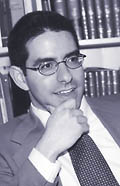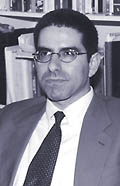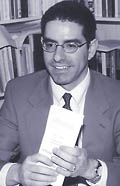 |
 |
|||||
 |
 |
 |
 |
 |
||||||||||
 |
 |
 |
||||||||
| Nicholas C. Lund-Molfese: “The best thing that could happen is
people come back to what I call a thick religious tradition and
away from worshipping the self.” Catholic New World photos by Sandy Bertog
Using professional ethics as a path to faith
Nicholas C. Lund-Molfese, 32, leads the Integritas Institute of
the John Paul II Newman Center at the University of Illinois at
Chicago. The institute promotes professional ethics, and, Lund-Molfese
said, helps bring people to God by encouraging them to think about
their obligations to their fellow human beings. Lund-Molfese will
write occasional columns for The Catholic New World. Nicholas C. Lund-Molfese: I start with the person. I’ve been fortunate to bump into people who were really questioning what they were supposed to do with their lives, what life means. Ethics is the way the average person originally comes in contact with a more-than-human source of meaning, so they become aware of some sense of right or wrong, of obligation, and then they come to the realization that the obligation has a personal source: God. And then they start to seek God. So the person that I’m describing would be your typical lapsed whatever, who was raised in a religious tradition and fell away from it, which is what I find is the most common case—the need for re-evangelization. TCNW: Are the programs of the institute open to students and faculty who are not Catholic? NCLM: Yes. All our programs are open to anybody who is interested.
The things the institute works on are universal. They’re questions
all people have to ask about meaning and value. Typically, that’s
what distinguishes the Integritas Institute’s programs from programs
more typical of the Newman Center. The Integritas Institute tries
to use reason available to everyone and particularly looks at
the different professions for guidance and consideration. The
professions have a long history of considering ethical questions
or ethical issues. NCLM: We are who we are, and I think the fact that our programs do
involve speakers from a variety of religious perspectives helps
people to see that our purpose isn’t to beat people over the head
and steal away adherents of other religions. We’re really trying
to help people who are alienated from their religious traditions,
and this is a way to do that. NCLM: It comes from a psalm that I fell upon. Those values are universal,
but they’re also Gospel-based. Charity goes beyond justice. It
gives what isn’t directly owed, or what one doesn’t have a strict
obligation to give. Justice is required, and it’s giving people
what is their due, and it’s something business people have a great
deal of reflection on, whereas mercy is something we more clearly
associate with nurses and with doctors. NCLM: Yes. Our goal is to be in every professional college at UIC,
and that’s a goal we’re steadily approaching. I’m talking with
the college of engineering about launching a full program next
semester where the institute would be responsible for giving an
introductory ethics lecture to all incoming students. We’re also
talking with the college of education. NCLM:This campus is 60 percent nominally Catholic. It has more Catholic students than any other college, Catholic or secular, in the Midwest. And the Newman Center doesn’t see all those students. The idea with the Integritas Institute is we do. They don’t come to our Masses, but they might come to a lecture on ethics in the workplace next semester. They don’t come to our Bible study, but they’re going to be a doctor, and they show up for a talk by Eugene Diamond (a member of the Catholic Physicians Guild) on euthanasia. Or they’re not Catholic, they’re Muslim, and they show up for one of our talks by a member of the Islamic Medical Association, and they learn more about a tradition that they might be estranged from. … I think the best thing that could happen is people come back to what I call a thick religious tradition and away from worshipping the self, which is what much of popular spirituality amounts to—worshipping a god made in your own image, basically worshipping yourself. Because we’re all fallen and we’re egoists, it’s very easy to fall into that trap. A thick religious tradition, like Catholicism, like Islam, like Judaism, prevents that, because it will teach things you don’t like. A thick religious tradition has a history, it has a body of belief. It has to be taken seriously. There are many issues that serious Jews and serious Muslims and
serious Catholics can agree on, and we’re very effective when
we work together. Basically, the institute wants to make these
reflections of these religious traditions intellectually respectable,
and present them. NCL: I have to decide what time to go home tonight. That’s a morally serious decision. I have a wife and two children waiting for me at home. I also have a ton of work sitting in this office. If these programs don’t happen, these students don’t get served, and there’s plenty of programs that don’t happen because we don’t have the resources. If I abandoned my family duties, we could definitely do more here. There’s no church teaching saying that you should work no more than eight hours a day at work. There is a church teaching about the duty that one owes one’s children and one’s spouse, and there is a church teaching about the diligence one owes one’s employer. So there are principles and there’s guidance. Front Page | Digest | Cardinal | Interview |
||||||||||